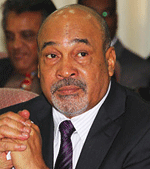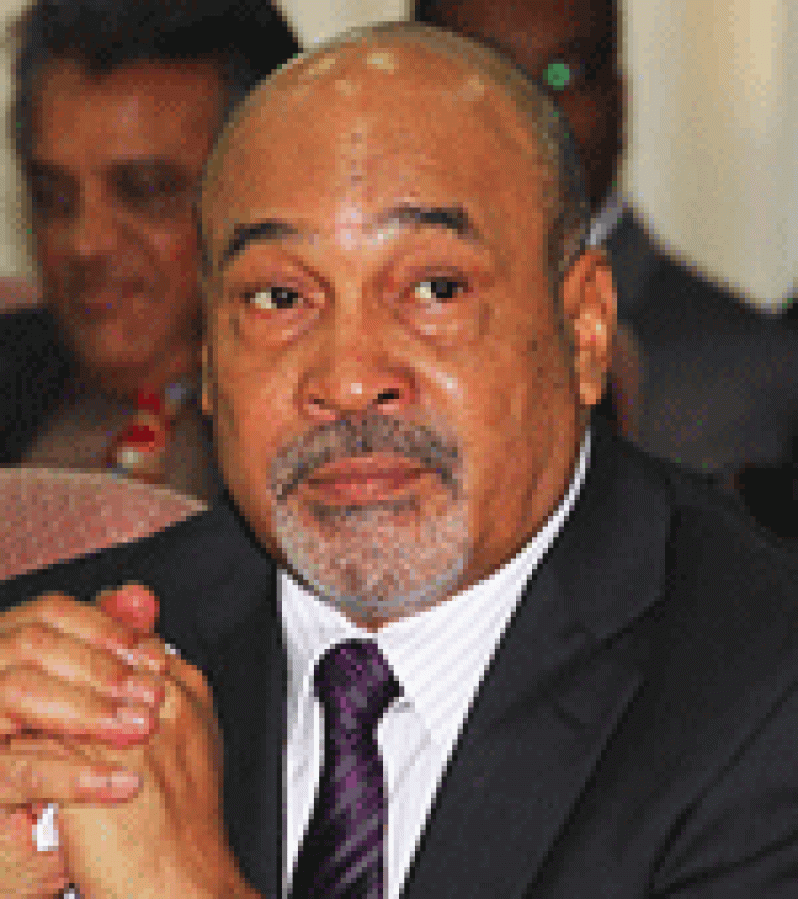–mixed signals on ‘amnesty’ for President Desi Bouterse
Analysis by Rickey Singh
A POLITICAL STORM is brewing in the Caribbean Community (CARICOM) member state of Suriname over the recent passage of new legislation by Parliament, which granted amnesty from prosecution to President Desi Bouterse and several other citizens implicated in a mass execution of fifteen (15) Surinamese almost a quarter century ago. The massacre at an army base had occurred amid rising political tension and uncertainties that followed a military coup in 1982, led by then army commander Bouterse  against a democratically elected civilian government in Paramaribo.
against a democratically elected civilian government in Paramaribo.
Ironically, it is Bouterse himself, now the democratically elected Head of State, and leader of a coalition government in Paramaribo, who was instrumental in securing Parliament’s approval to enact changes to the country’s amnesty law that made it possible for him to now be the leading beneficiary against prosecution for the political killings that occurred back in 1982.
But this amnesty development —unique in parliamentary governance in our 15-member Caribbean Community –has aroused at home passionate protests from civil society organizations in particular, as well as expressions of concern on applicability of the new law from the Inter-American Commission for Human Rights, and from Amnesty International.
In Suriname, a grouping of non-governmental organisations (NGOs) has declared in a statement that the country was at “a crossroads” over the new amnesty law. It is an occurrence, they argue, that’s quite contrary to a national mood that Bouterse himself had projected in his appeal for social harmony and consensus-building at his inauguration as Head of State in August 2010, following national parliamentary elections.
Significantly, however, even as such domestic protests were developing, the Organisation of American States (OAS) was announcing its acceptance of a formal request from the Suriname Government to help it with technical assistance for the establishment of an independent Truth and Reconciliation
Commission (TRC), related to the murders committed during the 1980s.
Parliament
The parliamentary vote for the new amnesty law was approved by a substantial majority, and the request for OAS assistance to create the TRC was formally done in a submission to Secretary General Jose Miguel Insulza by Suriname’s Foreign Minister, Winston Lackin, during the just-concluded Sixth Summit of the Americas in Cartagena, Colombia.
President Bouterse, who is the current chairman of CARICOM, was among participating Heads of State and Governments at the Summit of Americas. He also took part in the special meeting between President Barack Obama and leaders of the Caribbean Community, and has been consistent in his arguments for strengthening regional cooperation “at all levels”.
In sharp contrast to prevailing low-keyed relations between the Bouterse government and those of the USA and Canada, the Dutch government has announced an immediate suspension of already approved economic aid to Suriname, its former colony in the Caribbean, to demonstrate its own objection to the new amnesty law.
The approved new law consolidates immunity for violations of human rights committed during the ten-year period of military rule (1982-92) under Bouterse’s leadership.
It is relevant to observe here that, for all the national and international protests over the killings of the 15 Surinamese, NONE of the successive elected governments in Paramaribo over the past 24 years — including those with decisive parliamentary majorities — had taken any initiative of significance to generate public focus on the frustrating, tortoise-like approach of a military tribunal that has been dealing with the case of the massacred victims amid cries for justice from their families.
OAS and IACHR
Last week, the Inter-American Commission of Human Rights (IACHR), which has been monitoring human rights observances in Suriname for some years, was to express its “deep concern” over the new amnesty legislation in relation to the exclusion of provisions of a 1992 law that’s applicable to crimes against humanity and war crimes.
The Commission noted that the Inter-American Court of Human Rights has repeatedly established that an amnesty law “may not serve as a justification for failing to comply with the duty to investigate and to ensure access to justice. Specifically, it stressed, “states may not invoke existing provisions of domestic law, such as the 1992 Amnesty Law in the case of Suriname…”
Nevertheless, in speaking from Colombia, during the Sixth Summit of the Americas, about the Suriname Government’s request to the OAS, Secretary General Insulza promised to “provide all necessary technical assistance in order to bring about steadily improving tolerance and reconciliation through objective truth and finding….”
As Amnesty International and the IACHR maintain their respective concerns about the implications of Suriname’s new amnesty law, the OAS Secretariat and the Bouterse government could perhaps also reflect on the findings and recommendations of the Truth and Reconciliation Commissions that were established within months of each other in 1995, by Haiti (under President Bertrand Aristide) and South Africa, with Nelson Mandela as President.
For a start, it is felt that once the required technical personnel have been identified, the OAS could begin the process of assessing how Haiti, a fellow member of CARICOM, went about the basic groundwork for its Truth and Reconciliation Commission, which was mandated to probe the political killings and gross human rights violations perpetrated between the period September 29, 1991 and October 15, 1994 — when the first of two coups against the Aristide administration occurred.















